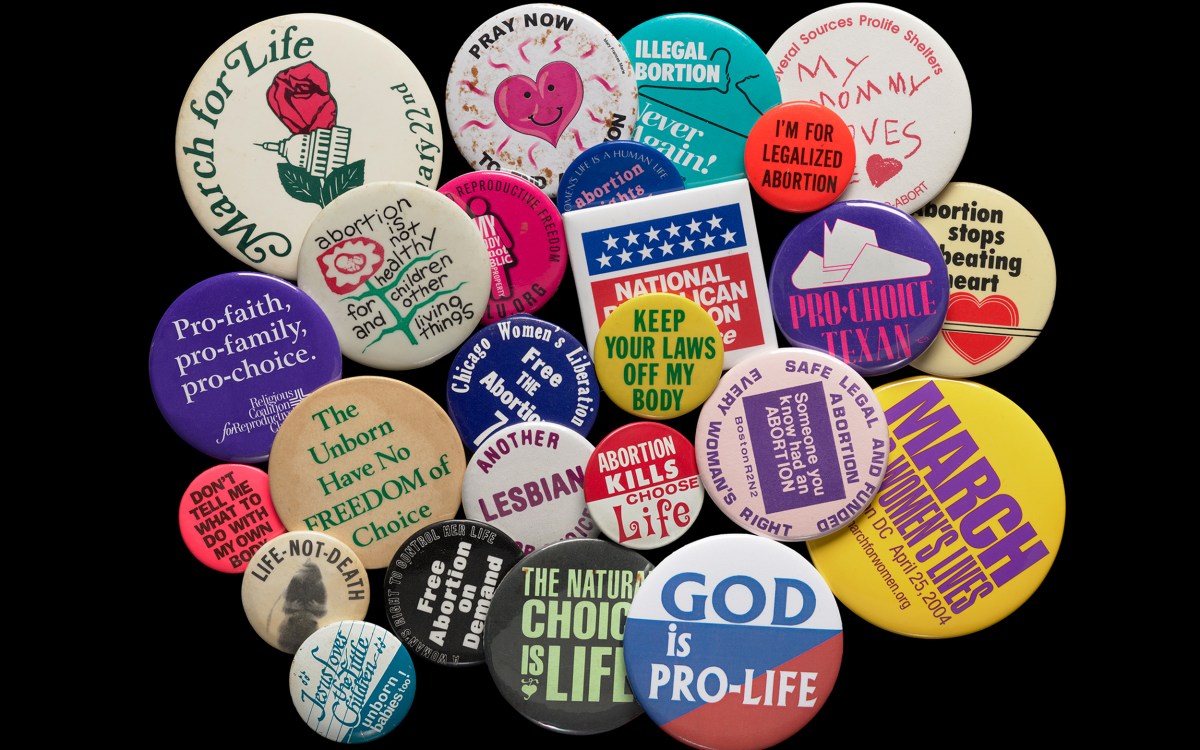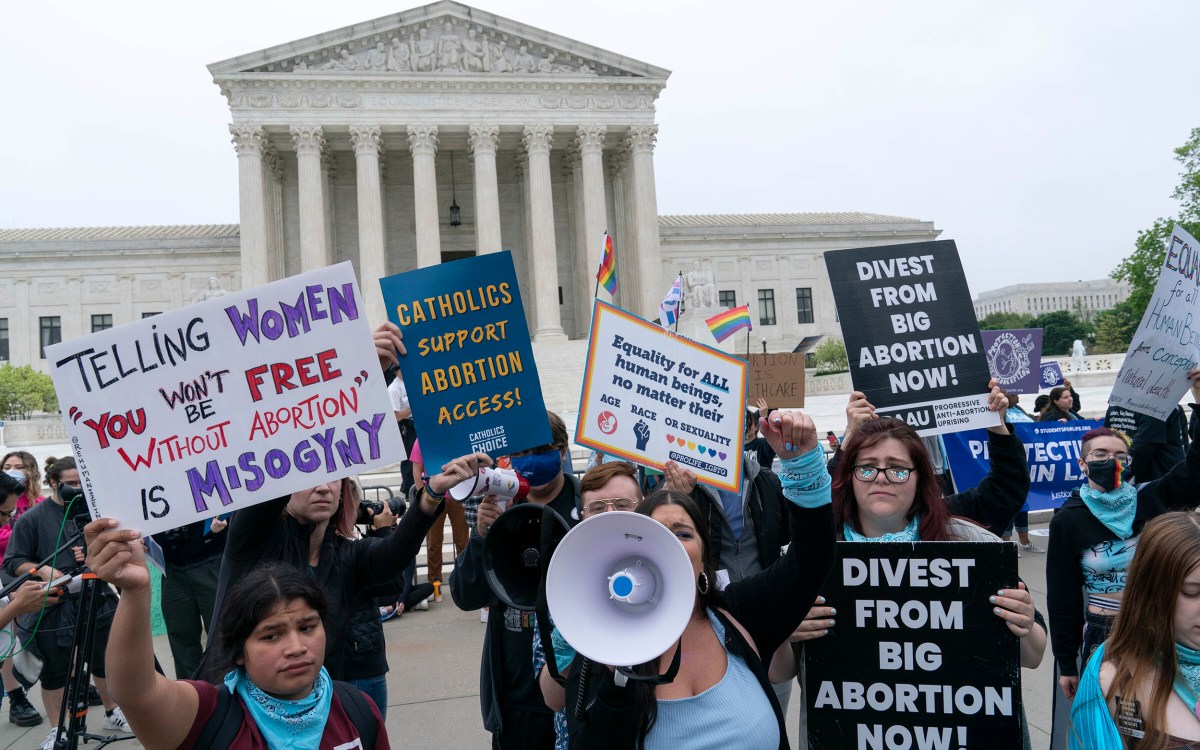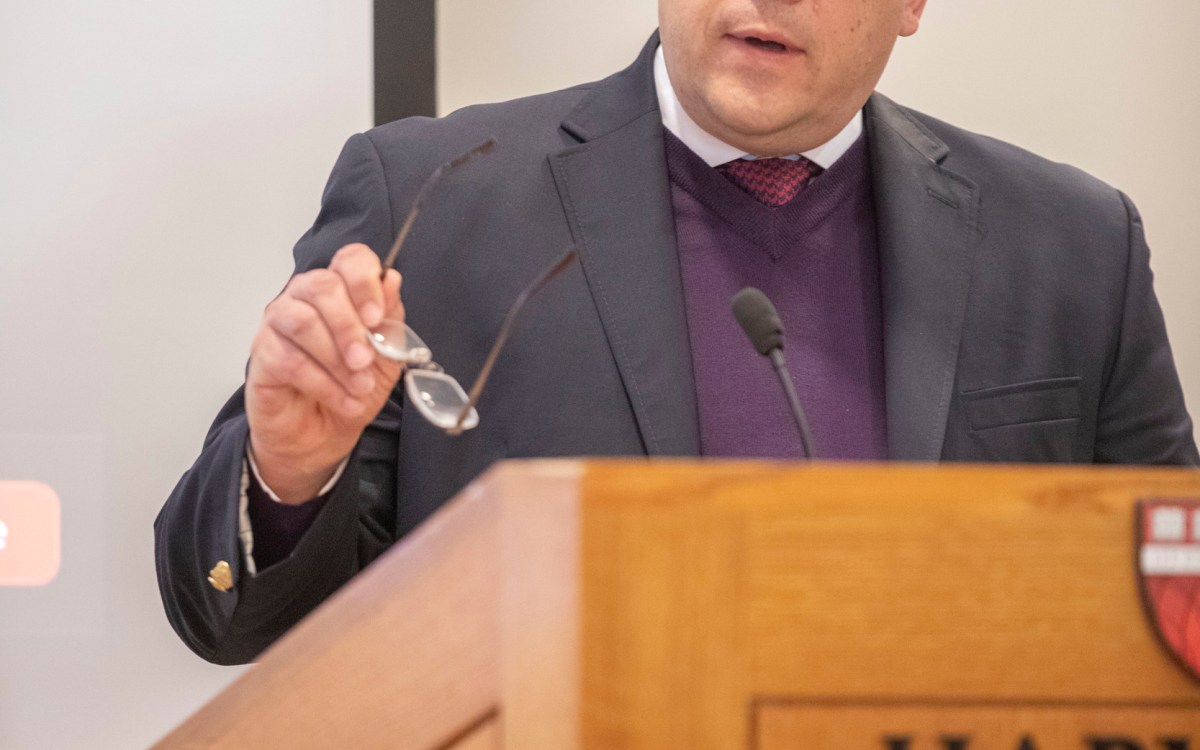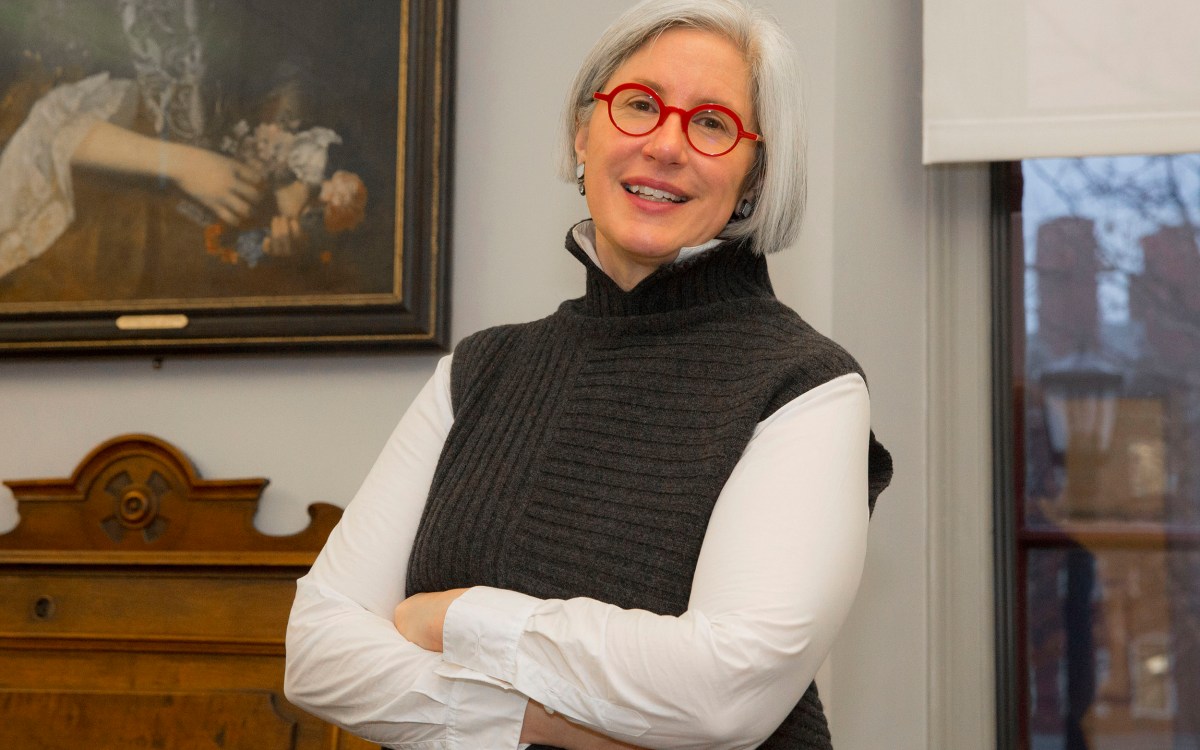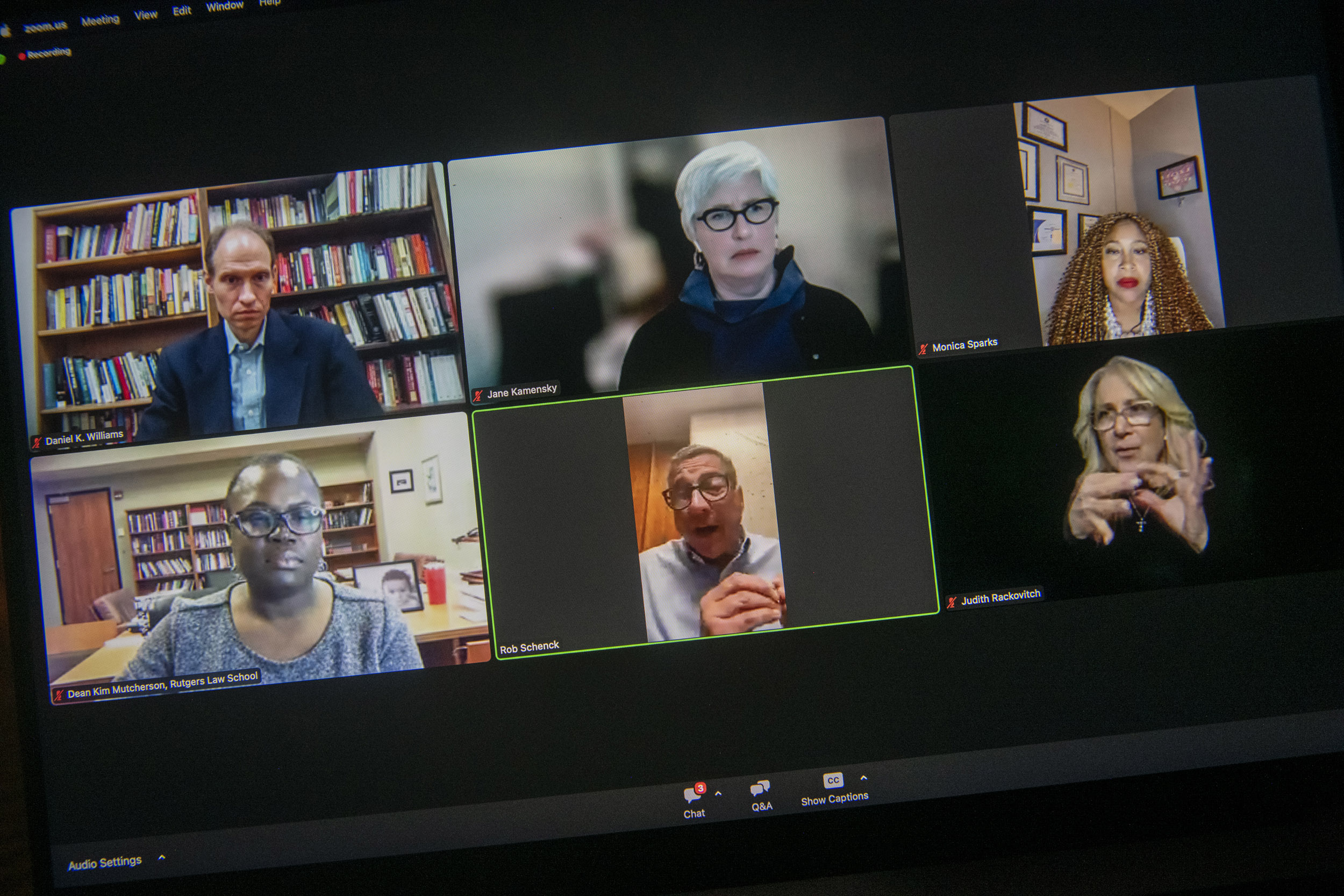
The Safra Center’s panel on abortion and reproductive rights offered diverse views from Daniel Williams (clockwise from top left), Jane Kamensky; Monica Sparks, Judith Rackovitch (signing), Robert Schenk, and Kimberly Mutcherson.
Jon Chase/Harvard Staff Photographer
Striving for impassioned, but reasoned, post-Roe conversation on abortion
Participants representing complex set of views engage at Safra Center discussion
Kimberly Mutcherson identifies herself as pro-choice and pro-abortion; Daniel K. Williams is “pro-life with an asterisk”; Monica Sparks calls herself a “whole-life Democrat”; and the Rev. Robert L. Schenck was anti-abortion most of his life but has had a change of heart.
These answers came in response to a question by moderator Jane Kamensky, the Carl and Lily Pforzheimer Foundation Director of the Arthur and Elizabeth Schlesinger Library on the History of Women in America at the Harvard Radcliffe Institute, on how each of the four panelists at a Thursday discussion on abortion and reproductive rights defined their own positions.
The event, hosted by the Edmond & Lily Safra Center for Ethics, aimed to bring together a range of voices to discuss perhaps the most complex and contentious topic of our times — made even more heated by the recent Supreme Court decision overturning Roe v. Wade — as part of the Civil Disagreement Series. Danielle Allen, Safra Center director and James Bryant Conant University Professor, offered an introduction before panelists wrestled with issues that ranged from body autonomy to the definition of personhood.
“When I’m talking about abortion, I’m never just talking about abortion,” said Mutcherson, a Rutgers Law School co-dean, bioethics professor, and abortion rights supporter. “I’m talking about all the issues that surround when, why, and how somebody decides to terminate a pregnancy.”
More to the point, said the mother of two, she belongs to the reproductive justice movement, which was started in the ’90s by Black women who were frustrated by mainstream reproductive rights organizations. She said the movement supports three tenets: the right of every woman to decide if she wants to have a baby, her right to decide to not have a baby, and the right — once she has a child — to be able to raise that child in a safe and healthy environment without fear of violence.
“When I’m talking about abortion, I’m never just talking about abortion. I’m talking about all the issues that surround when, why, and how somebody decides to terminate a pregnancy.”
Kimberly Mutcherson, Rutgers Law School co-dean
Williams, a University of West Georgia history professor, is author of the 2015 book “Defenders of the Unborn” about the evolution of the anti-abortion movement. He said he counts himself a backer with an asterisk because he opposes the movement’s current alliance with the political right. As a historian, he said, “I’m particularly interested in why we arrive at particular views.”
Sparks, an anti-abortion (or as she calls herself, “whole-life”) Democrat, recently won re-election as a Kent County Commissioner in Michigan. While saying that “more than one in three Democrats are pro-life,” she rejected the simplicity that label may imply. Instead, she asked, “Womb to tomb, how can we support women?”
Schenck, founder of the Dietrich Bonhoeffer Institute, recounted how his views on the issue evolved. An evangelical minister, he spent more than 30 years in the anti-abortion movement Operation Rescue. However, a late-in-life doctoral program “challenged all my assumptions and presumptions,” he said, when his research lead him to seeing similarities between his own activist religious movement and one that supported the Nazis. (Bonhoffer was an influential European moral theologian and Nazi dissident who was ultimately executed by Adolf Hitler’s regime.) This discovery led him to believe that such decisions should only be made by the women involved.
With Williams’ focus on changes in the anti-abortion movement, the history of the dispute came into the discussion. As a historian, he noted how opponents of abortion rights have increasingly focused on legal strategy, and he decried “the type of punitive laws that are being passed today.”
This history sparked one of the more confrontational exchanges when Sparks cited the early 20th century birth control activist Margaret Sanger. Noting that Sanger supported the racist pseudoscience of eugenics, Sparks described abortion as “rooted in racism,” with the goal “to erase the weak and feebleminded, which were African Americans, which were Latinos, which were people of color.”
Mutcherson contested both the depth of this history and its implications. “Abortion didn’t start with Margaret Sanger,” she said. “There are deep traditions in African societies and in Black American society to terminate pregnancy or ‘bring on’ periods.
“The idea that abortion is this thing that was foisted on Black communities deprives us of our agency,” she argued. “It deprives us of the ability to be decision-makers, and particularly of Black women to be decision-makers.”
“Part of respecting the personhood of the woman and her dignity is respecting that a woman knows this question in a way that a man can never know.”
the Rev. Robert L. Schenck
The discussion shifted to definitions of personhood, often a staple of arguments around abortion. As Williams pointed out, such definitions are tricky. The anti-abortion movement, he noted, says “human personhood cannot be separated from human life.”
More like this
“There is some beauty in this argument because any other definition of personhood is going to be potentially arbitrary and is going to potentially undercut the rights of some other group,” he said. Making personhood conditional on autonomy, for example, raises questions about the rights of the disabled.
Sparks picked up on this line of reasoning, arguing for the right to life throughout the life cycle: “Do we start with the blastocyst or the embryo or the fetus?” she said. “The child, the adult, or the senior? All of those are stages of being a human being.”
Both Schenck and Mutcherson demurred from restricting a discussion of abortion to any straightforward definition. “Personhood, for me, doesn’t end with autonomy,” said Schenck. “It ends with the individual who is closest to the experience.
“As a man I will never know this subject — this experience — in the way a woman does. Part of respecting the personhood of the woman and her dignity is respecting that a woman knows this question in a way that a man can never know.” Explaining how he “had to leave my fantasy of what it means to be pro-life,” he said, “I have come to the conclusion that … I have to respect her humanity and dignity in making that decision.”
Mutcherson said the issue is more complex than simply defining personhood. “Pregnancy is not neutral,” said the scholar, noting that motherhood has made her “more pro-choice.” Decrying the Supreme Court’s decision overturning Roe V. Wade, in particular Justice Amy Coney Barrett’s assertion that carrying unwanted children does not constitute a substantial burden, she described the dangers of pregnancy as well as the physiological changes it brings. She also widened the focus to look at the toll unwanted pregnancies as well as the criminalization of abortion take on families and communities.
“These are nuanced and complex issues,” she concluded. “When we try to flatten these out, we are never going to get good answers.” Sparks added: “It’s on us to keep having these discussions.”



